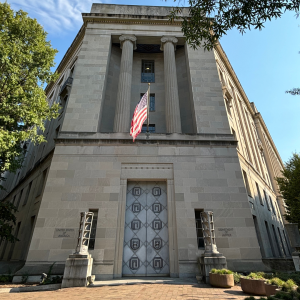Government credits HSR pre-merger notification program with halting anticompetitive deals.
Companies planning mergers and acquisitions tend to avoid challenging the Federal Trade Commission and the Department of Justice’s Antitrust Division once the agencies signal their concerns that deals may have anticompetitive effects. That is the conclusion of an annual report outlining the effectiveness of the Hart-Scott-Rodino Antitrust Improvements Act of 1976 recently released by the agencies.
Of the 1,805 mergers and acquisitions reported in 2023, the government took action in 28 of them, resulting in the abandonment or restructuring of 20 deals. The report claims the premerger notification program proved instrumental in helping the government take these actions. (See our related post HSR Notification Requirements Updated.)
Government 2023 Highlights by Industry
The healthcare industry, financial services, banking and consumer finance, technology, and transportation sectors were among President Biden’s areas of focus for anticompetitive enforcement, which he declared in a 2021 executive order. Below are noteworthy actions called out in the HSR Annual Report, including action in industries cited in that directive, plus our own updates and links to MoginRubin commentary.
 Healthcare and Pharmaceutical Industries
Healthcare and Pharmaceutical Industries
The report notes Amgen’s proposed $27.8 billion acquisition of Horizon Therapeutics, which the government successfully blocked. Detractors of the deal were concerned that Amgen could profit heavily from monopolizing two of Horizon’s products, Tepezza and Krystexxa. Stopping the merger reaffirmed the FTC’s focus on protecting competition in healthcare markets, the report said.
“It is particularly important to safeguard competition among pharmaceutical companies,” MoginRubin’s Timothy Z. LaComb wrote in a blog post on the proposed acquisition last year. “Competition leads to increased innovation and product quality, which saves lives and improves the quality of life for millions of people.”
The companies ultimately agreed to a consent decree preventing the bundling of Tepezza and Krystexxa, though it’s likely that action would have been considered unlawful discount bundling under Section 2 of the Sherman Act, LaComb wrote. Additionally, the consent order prevented Amgen from conditioning any product rebate or contract terms related to the sale or positioning of either drug; using any product rebate or contract term to exclude or disadvantage any potential competitors; or entering into any agreement or understanding to acquire products that would treat either of the diseases treated by the drugs.
Those actions were likely already illegal under the HSR or Sherman Act, however, leading LaComb to conclude, “In light of these factors, the consent decree does little more than remind Amgen that certain conduct is unlawful following the merger.”
In another action in the healthcare space last year, the FTC filed an administrative complaint and sought a preliminary injunction challenging a $700 million proposed acquisition of Propel Media by IQVIA, the world’s largest provider of healthcare data. The government said the deal would unlawfully reduce competition and increase prices. Following a two-week hearing, a federal court granted the Commission’s preliminary injunction and the parties abandoned the merger.
Other FTC actions prompted firms to abandon deals involving reproductive fertility treatments, medical stents, and the combination of two major health care systems, according to the report.
The Biden administration recently doubled down on its attempts to protect the healthcare industry from anticompetitive practices, announcing concern for the increasing ownership of companies in this sector by private equity firms. FTC Chair Lina M. Khan said, “[P]rivate equity roll-ups, strip-and-flip tactics and other financial plays … can enrich executives but leave the American public worse off.” A report from the Lown Institute suggests private equity buyouts of physician practices increased six-fold from 2012 to 2021 and about 30% of all for-profit hospitals in the country are now PE-owned.
Technology: Digital Gaming
It wasn’t all good news for the government. The HSR Report described the FTC’s unsuccessful attempt to stop Microsoft’s $69 billion purchase of popular game maker Activision Blizzard, which caught the Commission’s attention when announced in 2022. Despite the FTC’s efforts, the parties completed the acquisition on Oct. 13, 2023, a few months after a district judge denied a request to put the deal on hold pending trial of an administrative action.
But the FTC is not letting go. It still hopes to unwind the deal it could not prevent, and which has been approved in the United Kingdom and European Union. The FTC made it clear in the HSR Annual Report that it will press its objections via administrative proceedings. “The complaint alleged that with control over Activision’s blockbuster gaming franchises, Microsoft would have both the means and motive to harm competition by degrading Activision’s game quality or player experience on rival platforms, limiting access to Activision’s content, or withholding content from competitors entirely — resulting in a walled garden rather than an open market,” the government wrote in the HSR Report.
The Commission’s appeal of the district court decision is pending in the Ninth Circuit, where oral arguments were held in December 2023 (Federal Trade Commission v. Microsoft Corp., No. 23-15992, 9th Cir.). The FTC argued before the appellate panel that the district court’s evidentiary hurdle was too high. The Commission argued it only had to show the potential for Microsoft to withhold games from other platforms, not prove the deal was demonstrably anticompetitive, adding that Microsoft has repeatedly exhibited its penchant for anticompetitive moves. Microsoft, of course, said the district court came to the right conclusions.
Meanwhile, the FTC wasn’t the only litigant to contest the acquisition. Ten Call of Duty players sued Microsoft in late 2022 in an attempt to deny the company “far-outsized market power” through the acquisition. The players argued that the acquisition led to an increased price for the Xbox Game Pass subscription as the number of subscribers swelled from 25 million to more than 34 million after the deal. Microsoft, which called the arguments meritless, settled for undisclosed terms on Oct. 14, 2024 (Demartini v. Microsoft, No. 3:22-cv-08991-JSC, N.D.Calif.).
Finance and Consumer Lending
In the mortgage lending sector, the FTC filed an administrative complaint and pursued a preliminary injunction challenging Intercontinental Exchange’s $13.1 billion proposed acquisition of Black Knight. The deal would have brought together the two largest providers of home mortgage loan origination systems, which the FTC claims would have resulted in higher costs for homebuyers and lenders. After the government filed the complaint, the parties agreed to divest Black Knight’s Optimal Blue and Empower business platforms to Constellation Web Solutions. The consent order also prohibited the parties from enforcing noncompete or non-solicit provisions against employees.
 Travel Industry
Travel Industry
The HSR report hailed DOJ’s success in blocking a joint venture between American Airlines and JetBlue Airways and JetBlue’s proposed acquisition of Spirit Airlines. “These enforcement efforts protected millions of travelers — especially the most price-sensitive ones — flying on hundreds of routes across the country,” the report states. MoginRubin’s Jonathan Rubin commented on American Airlines and JetBlue deal, calling it a big win for the DOJ in its efforts to promote competition in an industry in which four carriers control 80 percent of the market. MoginRubin also reported on the JetBlue / Spirit Airlines matter.
Manufacturing
The report says DOJ action prompted Luxembourg-based steel pipe and tube company Tenaris S.A. to abandon its proposed acquisition of Benteler Steel & Tube Manufacturing Corp. The government claimed the deal would have diminished competition in the domestic supply of seamless tubing and production casing.
Energy
The DOJ objected to Vistra Corp.’s planned acquisition of Energy Harbor Corp.’s nuclear plants in the PJM Interconnection, a regional organization that manages an electricity grid serving more than 65 million consumers in parts of 13 states and Washington, DC. As a result, Vistra offered to restructure its proposed acquisition by divesting from a power plant in Ohio that the DOJ claimed could increase the company’s ability or incentive to withhold electricity to raise wholesale electricity prices in Ohio and Pennsylvania.
Conclusion
“Prior to the HSR Act, businesses could, and often did, consummate transactions that raised significant antitrust concerns before the agencies had an opportunity to review them,” the report concluded. “This practice forced the agencies to engage in lengthy post-acquisition litigation, during the course of which the transaction’s anticompetitive effects continued to harm competition; furthermore, if effective post-acquisition relief was not practicable, the harm continued indefinitely.”

